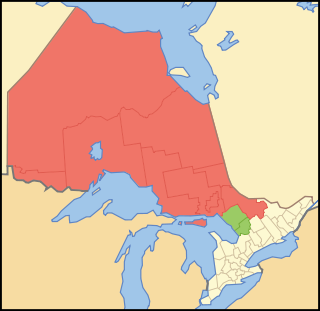
Graham Greene is a First Nations (Oneida) actor who has worked on stage and in film and television productions in Canada, the United Kingdom, and the United States. He has achieved international fame for appearing in Kevin Costner's Dances with Wolves (1990), which earned him an Academy Award nomination. Other notable films include Thunderheart (1992), Maverick (1994), Die Hard with a Vengeance (1995), The Green Mile (1999), Skins (2002), Transamerica (2005), Casino Jack (2010), Winter's Tale (2014), The Shack (2017), Wind River (2017) and Shadow Wolves (2019).

Northern Ontario is a primary geographic and quasi-administrative region of the Canadian province of Ontario, the other primary region being Southern Ontario. Most of the core geographic region is located on part of the Superior Geological Province of the Canadian Shield, a vast rocky plateau located mainly north of Lake Huron, the French River, Lake Nipissing, and the Mattawa River. The statistical region extends south of the Mattawa River to include all of the District of Nipissing. The southern section of this district lies on part of the Grenville Geological Province of the Shield which occupies the transitional area between Northern and Southern Ontario.

Kapuskasing is a town on the Kapuskasing River in the Cochrane District of Northern Ontario, Canada, approximately 92 kilometres (57 mi) east of Hearst and 130 kilometres (81 mi) northwest of Timmins. The town was known as MacPherson until 1917, when the name was changed so as not to conflict with another railway stop in Manitoba.

Tomson Highway is an Indigenous Canadian playwright, novelist, children's author and musician. He is best known for his plays The Rez Sisters and Dry Lips Oughta Move to Kapuskasing, both of which won the Dora Mavor Moore Award for Outstanding New Play and the Floyd S. Chalmers Award.
René Highway was an Indigenous Canadian dancer and actor of Cree descent from Brochet, Manitoba. He was the brother of playwright Tomson Highway, with whom he frequently collaborated during their time at Native Earth Performing Arts in Toronto, and the partner of actor and singer Micah Barnes.
The Dead Dog Café Comedy Hour was a radio comedy show on CBC Radio One for four seasons, running from 1997 to 2000. The show was set in a fictional café of the same name, in the equally fictional town of Blossom, Alberta. Both Blossom and the café were originally described in Thomas King's award-winning novel Green Grass, Running Water, though it was run by different characters. The show borrowed numerous elements from King's novel.

Native Earth Performing Arts is a Canadian theatre company located in Toronto, Ontario. Founded in 1982, Native Earth is Canada's oldest professional Indigenous theatre company. Native Earth is dedicated to developing, producing and presenting professional artistic expressions of the Indigenous experience in Canada.

Theatre Passe Muraille is a theatre company in Toronto, Ontario, Canada. It is on Ryerson Avenue in the Alexandra Park neighbourhood of Toronto.
The Debajehmujig Storytellers, also Debahehmyjig Theatre Group, or informally Debaj, is a First Nations theatre group and multi-arts organization based in the Wiikwemkoong Unceded Territory on Manitoulin Island in Northern Ontario. Debaj is the longest running Indigenous theatre in North America.
Helen Betty Osborne, known as Betty Osborne, was a Cree Indigenous woman from Norway House reserve who was kidnapped and murdered while walking down Third Street in The Pas, Manitoba.
Dry Lips Oughta Move to Kapuskasing is a play by Canadian writer Tomson Highway (Cree), which premiered in 1989 at Theatre Passe-Muraille in Toronto.
Billy Merasty is an Aboriginal Canadian actor and writer of Cree descent.

Carlos del Junco is a Cuban-Canadian harmonica player.

Evan Tlesla Adams is an Indigenous Canadian actor, playwright, and physician. A Coast Salish from the Sliammon First Nation near Powell River, British Columbia, he is best known internationally for his roles in the films of Sherman Alexie, as Thomas Builds-the-Fire in the 1998 film Smoke Signals and Seymour Polatkin in the 2002 film The Business of Fancydancing.
Cheri Maracle is an Aboriginal Canadian actress and musician of Mohawk-Irish descent.

Shirley Cheechoo is a Canadian Cree actress, writer, producer, director, and visual artist, best known for her solo-voice or monodrama play Path With No Moccasins, as well as her work with De-Ba-Jeh-Mu-Jig theatre group. Her first break came in 1985 when she was cast on the CBC's first nations TV series Spirit Bay, and later, in 1997, she found a role on the CBC's TV series The Rez.
Rose is a play by Tomson Highway, which premiered on January 31, 1999, at the University of Toronto.
The (Post) Mistress is a musical play by Tomson Highway. The play has also been staged in a French version titled Zesty Gopher s'est fait écraser par un frigo and a Cree version titled Kisageetin, although The (Post) Mistress, a predominantly English show which retains some French and Cree lyrics, is the most widely produced version.
Pig Girl, first produced in November 2013 and then published in November 2015, is a play by Colleen Murphy that draws upon the events of the 2007 Pickton case surrounding the murders of Indigenous women by Port Coquitlam pig farmer Robert Pickton. The play tells the stories of the fictionalized characters Dying Girl, Killer, Sister, and Police Officer in order to illuminate the Canadian issue of missing and murdered Indigenous women. Pig Girl was awarded both a Carol Bolt Award and a Governor General's Award.
Patricia Cano is a Peruvian Canadian singer and actress from Sudbury, Ontario, most noted for her musical theatre performances in the stage musicals of Tomson Highway. She graduated from the University of Toronto in Spanish Literature and Theatre.








